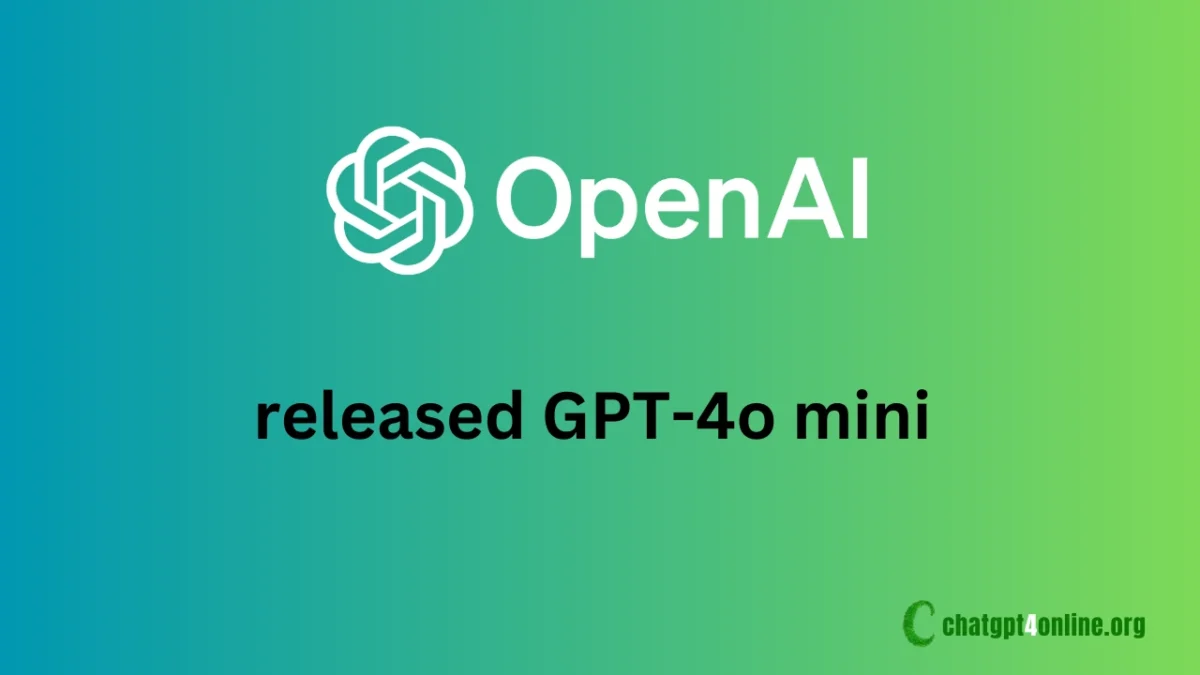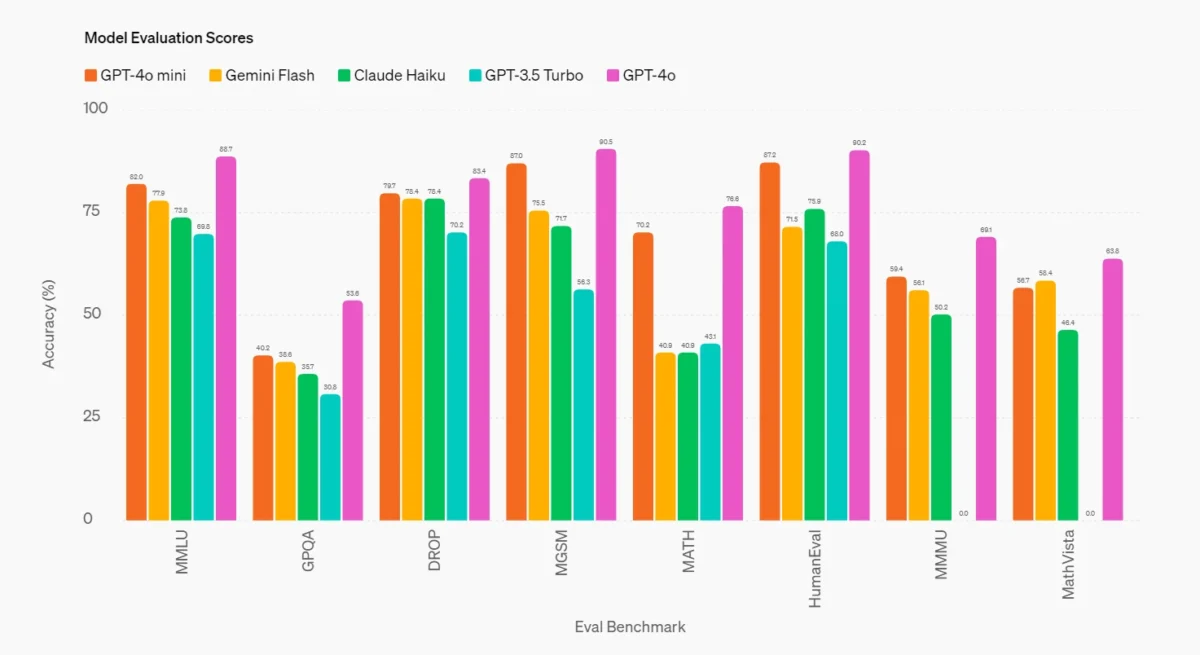Tiny Model, Huge Impact: GPT-4o mini by OpenAI
Today, OpenAI has released a small GPT model called GPT-4o mini, a cheaper and smarter model than the previous ChatGPT models. The company has done it again by releasing a cost-effective and highly accessible model that promises to change the game.
This mini GPT model has replaced GPT-3.5 Turbo in ChatGPT Free, Plus, and Team packages. It’s also available in API for developers.
GPT-4o mini is set to make advanced AI capabilities available to a broader audience, including developers and businesses that previously found such AI technology out of reach.
What is GPT-4o mini?
GPT-4o mini is OpenAI’s latest addition to its family of language models. It’s smaller and more efficient than its predecessors, yet it packs a punch in terms of performance. The model scores an impressive 82% on the MMLU benchmark, outperforming its predecessor, GPT-3.5 Turbo, by a significant margin.
It costs 60% less than GPT-3.5 Turbo. It’s priced at just 15 cents per million input tokens and 60 cents per million output tokens, making it an affordable option for a wide range of AI applications.

The affordability and efficiency of the mini GPT model open up new possibilities for AI applications. This model allows for tasks that require low cost and latency, such as real-time text responses or handling large volumes of context, like full code bases.
Its cost-effectiveness makes it accessible to smaller businesses and developers, potentially democratizing the use of advanced AI.
What makes this mini-modal different?
GPT-4o mini sets a new standard in artificial intelligence (AI), offering powerful capabilities such as text and vision support, a large number of tokens, and multimodal reasoning.
Text and Vision Support
This latest mini GPT supports both text and vision inputs, making it versatile for a range of applications and use cases. This dual capability allows the model to understand and generate content that integrates both textual and visual elements, enhancing its utility in fields like content creation, customer service, and data analysis.
OpenAI has plans to expand the GPT-4o mini’s capabilities to include image, video, and audio inputs and outputs. This expansion will further increase the model’s versatility, enabling it to handle a wider variety of tasks and applications, from multimedia content creation to sophisticated data processing.
GPT-4o also has vision feature and is expected to have voice support as well.
Large Context Window
The model boasts a context window of 128K tokens, which is significantly larger than what many other models offer. This means it can process and retain a substantial amount of information within a single interaction, making it ideal for complex tasks that require understanding long pieces of text or maintaining the context of extended conversations.
The mini modal of OpenAI can generate up to 16K output tokens per request. This large output capacity allows for the production of detailed and comprehensive responses, making it highly effective for applications that require extensive text generation, such as automated report writing or detailed customer service replies.
Multimodal Reasoning
According to OpenAI, GPT-4o mini excels in tasks involving both text and vision, outperforming other small models in various benchmarks. For instance, it scores 82% on the MMLU benchmark, demonstrating superior textual intelligence and reasoning capabilities. In comparison, Gemini Flash scores 77.9%, and Claude Haiku scores 73.8%.
When evaluated on multimodal reasoning, GPT-4o mini outperforms its competitors. It scores 59.4% on the MMMU (a multimodal reasoning evaluation), compared to 56.1% for Gemini Flash and 50.2% for Claude Haiku.
This indicates that the mini GPT is not only proficient in the text but also in understanding and generating contextually relevant content that integrates visual information.
Learn how GPT 5 is far better than GPT-4o, as Sam Altman said.
How does OpenAI tackle security concerns?
OpenAI says that during the pre-training phase, GPT-4o mini is designed to filter out harmful content, including hate speech, adult content, and spam. This proactive filtering helps ensure the model’s outputs are safe and appropriate for users.
The owner company of ChatGPT claims to employ reinforcement learning with human feedback (RLHF) to align the model’s behavior with human values and policies. This method improves the accuracy and reliability of the model’s responses, reducing the risk of inappropriate or biased outputs.
The company is using the instruction hierarchy method to make it more secure for its users. This new technique helps the model resist prompt injections, jailbreaks, and other forms of manipulation.
How is GPT-4o mini better than Gemini & Claude Models?

GPT-4o mini outperforms both Gemini Flash and Claude Haiku in reasoning tasks involving text and vision. Its score of 82% on the MMLU benchmark surpasses Gemini Flash’s 77.9% and Claude Haiku’s 73.8%.
On the MGSM benchmark, which measures mathematical reasoning, the mini modal scores 87%, compared to 75.5% for Gemini Flash and 71.7% for Claude Haiku. Similarly, in coding tasks measured by HumanEval, the mini GPT-4 achieves 87.2%, outperforming Gemini Flash (71.5%) and Claude Haiku (75.9%).
Additionally, in multimodal reasoning, OpenAI’s latest model again leads with a score of 59.4% on MMMU, compared to Gemini Flash’s 56.1% and Claude Haiku’s 50.2%. This indicates that GPT-4o mini is particularly strong in integrating and reasoning across different types of data.
The release of this latest GPT is an exciting development in the AI world. It represents a significant step towards making advanced AI accessible and affordable for everyone. This model has the potential to revolutionize industries by enabling the development of sophisticated applications without the high costs typically associated with AI.
As we see more integration of models like GPT-4o mini in everyday applications, the impact on productivity and innovation could be profound.
Discover 50 ChatGPT prompts to find your Next profitable Startup Idea in 2024.
Final Thoughts
GPT-4o mini is a small model with a huge impact. Its affordability, efficiency, and advanced capabilities make it a game-changer in the field of artificial intelligence.
As OpenAI continues to drive down costs and enhance model capabilities, we can expect AI to become an even more integral part of our daily digital experiences.
Albert Haley
Albert Haley, the enthusiastic author and visionary behind ChatGPT 4 Online, is deeply fueled by his love for everything related to artificial intelligence (AI). Possessing a unique talent for simplifying complex AI concepts, he is devoted to helping readers of varying expertise levels, whether newcomers or seasoned professionals, in navigating the fascinating realm of AI. Albert ensures that readers consistently have access to the latest and most pertinent AI updates, tools, and valuable insights. Author Bio


